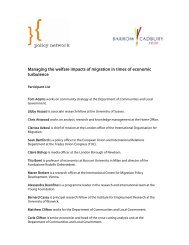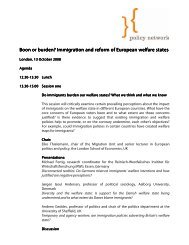Education, Heartbeat of a Nation - Policy Network
Education, Heartbeat of a Nation - Policy Network
Education, Heartbeat of a Nation - Policy Network
Create successful ePaper yourself
Turn your PDF publications into a flip-book with our unique Google optimized e-Paper software.
21st Century Public Services – David Miliband<strong>Education</strong>.<strong>Heartbeat</strong><strong>of</strong> a <strong>Nation</strong>David MilibandThe future<strong>of</strong> teachingvol 2.1 progressive politics 19
21st Century Public Services – David MilibandTo be on the left in the 21st century isto stand for a modern and expansivevision <strong>of</strong> citizenship – a vision <strong>of</strong>human cooperation to meet thechallenges <strong>of</strong> interdependence.In the UK, the desire to give modernmeaning to the word citizenship runsthrough the heart <strong>of</strong> the Government’sambitions for the country. We arecommitted to giving new meaning tothe notion <strong>of</strong> economic citizenship, byIf public servicesare soul <strong>of</strong> a nation,then education isits heartbeat.building a more inclusive marketeconomy, where more people benefitfrom economic growth. We know thatsocial citizenship in a multicultural,multi–faith society can only be built onthe basis <strong>of</strong> a clear social contract <strong>of</strong>rights and duties; citizenship is aboutwhat we hold in common, whateverour differences. We believe that in aninterdependent world, our citizenshipand solidarity must stretch acrossborders, notably across Europe wherewe are committed partners in theEuropean Union, but also across theAtlantic and more widely to tacklepressing issues <strong>of</strong> development andenvironmental sustainability.The Public Service EthicAt the heart <strong>of</strong> this vision are publicservices. The reasoning is simple.Services provided by the communityfor the community, when they are <strong>of</strong>high quality, can deliver opportunityand security, both at the core <strong>of</strong> fullcitizenship.There is an ethic <strong>of</strong> public service. Ithelps define our values as a society:cooperation as well as competition,selflessness as well as self-interest. Itexplains why ordinary people doextraordinary deeds, day-in and dayoutin education, social services,health care. It is the ethic <strong>of</strong> publicservice that holds countries together.Public service unifies when theeconomy can divide; public serviceasserts values when the talk is <strong>of</strong>prices; public service is about ‘us’when too <strong>of</strong>ten the talk is about ‘I’.I believe that education has a specialplace. If public services are the soul <strong>of</strong>a nation, then education is itsheartbeat.<strong>Education</strong> cannot solve every problem– from employment to crime to healthto social tolerance. But without aneffective education system, above allfor children but also for adults, we willsolve none <strong>of</strong> these problems.Classrooms are the place where wedecide our economic and social future– how much we earn, how we live, howwe get on. Schools are where wedelineate our values, fosterresponsibility, and build inclusivecommunities.So much so obvious. Our challenge isto design and deliver education in atime <strong>of</strong> rapid economic, social andpolitical change. Vital to this isschooling for young people.Schooling from the BottomUpThe demands on young people arechanging. A modern productiveeconomy cannot afford to leave themajority behind. A modern societyneeds every member <strong>of</strong> the first genomegeneration to play his or her part in acomplex and knowledge-rich society.20 progressive politics vol 2.1
Meanwhile, the demands <strong>of</strong> youngpeople are changing. A recent survey inmy country noted that 70 per cent <strong>of</strong>young people at secondary level saidthey were bored. We need to addressthe mismatch between what turns onyoung people and how we teach.The key to success in modernising ourpublic services is to think about thefuture <strong>of</strong> the service from the point <strong>of</strong>view <strong>of</strong> the consumer.First, what does the consumer need?Schooling in the 21st century has threegreat purposes: the transmission <strong>of</strong>knowledge to young people, thebroadening <strong>of</strong> their horizons, and thedevelopment <strong>of</strong> their competence tolearn more in the future, in preparationfor a life <strong>of</strong> change. <strong>Education</strong> must bedesigned clearly for these purposes.Second, what are theirresponsibilities? Consumers <strong>of</strong>education, young people, are notmerely shoppers in a great educationalmarketplace. They are also coproducers.It is true across publicservice: we are citizens withresponsibilities as well as consumerswith rights. We therefore face a dualresponsibility: not merely to designschooling around the interests <strong>of</strong> thelearner, but actively to engage thelearner in the process <strong>of</strong> learning.Third, what are the implications for thenature <strong>of</strong> service delivery <strong>of</strong> the focuson the learner? In education I thinkmost people would be surprised thatdespite the enormous advances ineducation and in technology over thelast 50 years the structure <strong>of</strong> schoolinghas hardly changed: large institutions,classes <strong>of</strong> 20-30 led by a singleteacher, lessons <strong>of</strong> 45 minutes or so.Yet this is the case, with remarkablylittle deviation around our country orbetween countries.Focus on LearningWhat we teach, how we teach and thesort <strong>of</strong> institutions in which childrenlearn are the keys to success.In the UK what we teach is set down inour <strong>Nation</strong>al Curriculum. With twoexceptions, our curriculum is prettystable. In the future, we needsignificant upgrading <strong>of</strong> the vocationalquality <strong>of</strong> our 14-19 curriculum. Andthis year Citizenship became a newTo realise the vision<strong>of</strong> more personalisedteaching andlearning we mustembrace the chanceto do thingsdifferently. This is nota threat topr<strong>of</strong>essionalism but anew support for it.part <strong>of</strong> the national curriculum,ensuring entitlement for all 11 to 16year olds in England. According to thisblueprint there are three closely linkedelements <strong>of</strong> Citizenship: social andmoral responsibility, political literacy,community involvement. Each is acrucial building block in equippingyoung people to play their full part insociety today and to face the futurewith confidence. The flexibleprogramme <strong>of</strong> study sets out whatpupils will learn. For instance they willlearn about: legal and human rights;the electoral system and theimportance <strong>of</strong> voting; the role <strong>of</strong>voluntary organisations in theeconomy and the significance <strong>of</strong> themedia in society – to mention a few.vol 2.1 progressive politics 21
21st Century Public Services – David MilibandSchools have the freedom to decidethe best way to deliver this on theground.Our focus in raising standards istherefore on how we teach –supporting the teaching and learningexperience itself, and above allensuring that how we teach is basedon what we know about how childrenand young people learn.We know from experience andresearch what makes for successfulteaching and learning. Pace,excitement, variety, engagement –even fun – are the watchwords <strong>of</strong> thesuccessful lesson.From the teacher this demandsinteraction with students throughoutthe lesson. It requires a variety <strong>of</strong>teaching approaches, with tasksclearly structured, questions askedand debated, and a constant focus onmeeting curriculum goals andenhancing the learning skills <strong>of</strong> thestudents.For the student it means a demandingcombination <strong>of</strong> rememberinginformation, understanding andinventing concepts, buildinghypotheses and testing them. It meansextracting information and ideas fromlectures and presentations. It meansbeing ready to take initiative inplanning personal study, and workingwith others in co-operative tasks.Teaching in the 21stCenturySince the foundation <strong>of</strong> teaching, thebalance between prescription andautonomy, and collaboration andindividualism, has been contested.Today there is demand for synthesis:personal responsibility for goodpractice allied to collaboration withother teachers and other staff todeliver results.In teaching it is isolation that for toolong has been the enemy <strong>of</strong>improvement. We must ensure thatteachers work together, work withother adults, and work with newtechnology, to crack problems inteaching practice: how to motivateboys, how to challenge lowexpectations, how to achieve gooddiscipline. No teacher should ever feelon their own when it comes to lessonTeaching todaymeans palm-tops,the Internet anddazzling digitalmedia.planning, dealing with unruly pupils,organising the class to ensure there isindividual attention. But this requires astep-change in at least six areas <strong>of</strong>pr<strong>of</strong>essional practice.First, teaching needs to make best use<strong>of</strong> all available technology. 100 yearsago this meant a desk and achalkboard. Today it means palm-tops,the Internet and the dazzlingpossibilities <strong>of</strong> digital media.In the UK our first challenges were tocut the price <strong>of</strong> connections, spreadhardware, train teachers and develops<strong>of</strong>tware. There has been significantprogress in all four areas. But muchmore is possible so ICT is not just abolt-on to the learning experience.In the decade ahead, we need to usethe scope <strong>of</strong> ICT to personalise thecurriculum, to help support pupils’progress and to encourage problemsolvingactivities individually and in22 progressive politics vol 2.1
groups. We need to grasp theopportunities <strong>of</strong>fered by CurriculumOnline – the ‘digital curriculum’ –which can supplement the standardcurriculum <strong>of</strong>fer. We need to use thepower <strong>of</strong> ICT to organise learning inmore effective units <strong>of</strong> time, and alsotake schooling beyond school time. Weneed to use ICT to make for moreefficient and useful assessment andtesting. And we need to see a stepchange in the quality <strong>of</strong> theeducational tools available to theteacher, with genuine savings in timeand workload, as it becomes the normfor every teacher to plan, teach, andmark using a laptop.Second, there have been dramaticsteps forward in developing anintelligent accountability framework ineducation, based on national tests.70 per cent <strong>of</strong>young people atsecondary schoolsay that theyare bored.But we must get the right balancebetween assessment for learning andassessment <strong>of</strong> learning.Assessment for learning is the use <strong>of</strong>data to promote student learning.Other teachers are involved throughpr<strong>of</strong>essional discussion <strong>of</strong> themeaning <strong>of</strong> the data and subsequentadjustment <strong>of</strong> teaching strategies.Students are involved by settingtargets, developing action plans, andevaluating success.To ensure high quality teaching in the21st century, together we need toensure that data will be used at fourlevels. In classrooms to identifystudent learning needs and theappropriate teaching strategies, withevery pupil working towards apersonal set <strong>of</strong> learning targets. Inschools to celebrate good teachingand plan pr<strong>of</strong>essional developmentactivities. In Local <strong>Education</strong>Authorities appropriately to <strong>of</strong>ferchallenge and support. Everyunderperforming school anddepartment needs to be on the road toimprovement. At the <strong>Nation</strong>al levelpolicy and resources need to beproperly developed and allocated.Third, if we are going to focus betteron effective teaching, and if we aregoing to improve it for the majority, weneed world class ContinuousPr<strong>of</strong>essional Development. Theresearch suggests too many in-serviceinitiatives do not meet their goals. It isalso striking how few schools organisetraining on a cross-curricular basis.We need to work with schools toensure that high quality staffdevelopment in the ‘workshop’, theINSET course where teachers gainunderstanding and seedemonstrations, is related back to the‘workplace’ – the classroom andschool. That requires the opportunityfor sustained practice, collaborationand peer coachingIn Japan, the dominant form <strong>of</strong> inservicetraining is the ‘lesson study’,where groups <strong>of</strong> teachers work on thedesign, implementation, testing, andimprovement <strong>of</strong> “research lessons”.We need to make pr<strong>of</strong>essionaldevelopment more demanding,collaborative, well paced and useful –exactly what we demand for ourstudents.This brings me to my fourth issue – theradical reform <strong>of</strong> the school workforce.vol 2.1 progressive politics 23
21st Century Public Services – David MilibandWe are committed to an expanding,better paid, and better supportedteaching force. But we also know itmakes no sense for the teachingpr<strong>of</strong>ession to be untouched by thebreakdown in demarcations, and by thedevelopment <strong>of</strong> front-line flexibility,that is the basis <strong>of</strong> effective serviceacross the public and private sectors.In October, the Government maderadical proposals for reform <strong>of</strong> theteachers’ contract, and for remodelling<strong>of</strong> the school workforce. The aim is tocut teachers’ workload, reverse thetrend towards a smaller and smallershare <strong>of</strong> the teaching week beingdevoted to teaching and at the sametime raise the quality <strong>of</strong> the learningexperience. The key is to make muchmore use <strong>of</strong> a wider range <strong>of</strong> adultexpertise, from the learning mentorhelping children with behaviourproblems to the lab technician inscience lessons to the languagespecialist.To realise the vision <strong>of</strong> morepersonalised teaching and learning wemust embrace the chance to do thingsdifferently: different ways <strong>of</strong> doingadmin tasks, different ways <strong>of</strong>providing cover, different ways <strong>of</strong>promoting high quality learning, underthe leadership <strong>of</strong> a qualified teacher,but not only using qualified teachers.This is not a threat to pr<strong>of</strong>essionalismbut a new support for it.Fifth, no change is likely without highquality school leadership. In a system<strong>of</strong> devolved but accountableresponsibility institutional leadershipis key.The quality <strong>of</strong> each lesson is not onlydown to each teacher. It needs to besupported by a whole school approachto teaching and learning, every schoola pr<strong>of</strong>essional community <strong>of</strong> teacherswho are also informed learners andeffective colleagues. Togethertherefore we need to support today’sleaders to ask and answerfundamental questions about schoolorganisation and practice.The devolution <strong>of</strong> budgets meansthere is more flexibility for schoolleaders, but more hard choices too.These are choices for Heads and forGovernors: they need the capacity andsupport to make them. Performancemanagement should be a right not aWe need to see astep change in thequality <strong>of</strong> theeducational toolsavailable toteachers.threat. Every leader needs to lead thedevelopment <strong>of</strong> his or her staff. Wehave made significant strides forwardin the UK with the introduction <strong>of</strong>threshold payments which <strong>of</strong>fer a 10%pay boost to teachers passing aperformance threshold after five yearsin the pr<strong>of</strong>ession. Now we face thechallenge <strong>of</strong> ensuring that the paysystem is an effective part <strong>of</strong> wholeschoolimprovement strategies. Andthe leadership team itself needs to bedeveloping, engaging a range <strong>of</strong>skilled pr<strong>of</strong>essionals to provideeffective leadership for the school.We have taken the first, important stepin establishing the <strong>Nation</strong>al College forSchool Leadership. The newLeadership Incentive Grant (LIG)represents dedicated money for the1400 most challenging secondaryschools (out <strong>of</strong> 3500) to raise thequality <strong>of</strong> leadership.Finally, we need to link what is done inthe classroom to provision beyond theclassroom. It stands to reason thatespecially for disadvantaged childrenschooling needs to compensate forfamily circumstances, but it can only doso if provision out <strong>of</strong> school hoursprovides for motivation and engagementas well. This calls not for longer hours forteachers but for the development <strong>of</strong>serious youth provision, using theotherwise fallow school estate.Reform Works: Schools asEngines <strong>of</strong> ChangeEngland has historically had aschooling system where the bestprovision was world class, but theaverage was not good enough. Thatremains a fair summary <strong>of</strong> ourchallenge. Since 1997 I am pleased tobe able to report significant progress –such that the OECD reports that wehave one <strong>of</strong> the fastest-improvingeducation systems in theindustrialised world.The foundation <strong>of</strong> progress has been inprimary education, where threequarters <strong>of</strong> 11 year olds now leaveschool reading, writing and countingwell, and one third have the readingage <strong>of</strong> a 12 or 13 year old. Significantlythe fastest progress has been in theareas <strong>of</strong> greatest disadvantage; andvital to my argument about the focuson how we teach, the reason forimprovement has been concentratedattention on the teaching techniques<strong>of</strong> all 220 000 primary school teachersin the country.In the secondary sector we are seeingindications <strong>of</strong> fast improvement in somedisadvantaged city areas that have beenpiloting some <strong>of</strong> our nationalprogrammes, summarised in our24 progressive politics vol 2.1
‘diamond <strong>of</strong> reform’. This reformprogramme concentrates on four areas.First, the quality <strong>of</strong> school leardership.Second, the right balance betweenevery school having a centre <strong>of</strong>excellence or specialism, and everyschool being committed to collaborationwith other schools in the system. Third,reform <strong>of</strong> the school workforce. Andfourth, partnership beyond theclassroom notably with parents.The essence <strong>of</strong> the system beingdeveloped in England is based on twosimple principles. First that thesubsidiarity principle needs to beapplied to public services and not justpolitical structures. This means thatmaximum power and flexibility isdevolved to the front line – schools.Budgets and bureaucracy must bestructured to give Head teachers andtheir staff the power to suit localprovision to local need.Second, this principle <strong>of</strong> localempowerment needs to be matched byintelligent accountability and targetedintervention. For us that meansqualitative data from schoolinspections as well as quantitativedata from examinations and testsguiding challenge and supportprovided from above the school level.The role <strong>of</strong> the Department for<strong>Education</strong> and <strong>of</strong> Local <strong>Education</strong>Authorities in this system is not to runschools. It is to promote localpr<strong>of</strong>essional capacity for the delivery<strong>of</strong> effective education. That must meansetting national standards forachievement, along with the systems<strong>of</strong> data sharing to promote effectivepractice; it means developing newprogrammes <strong>of</strong> innovation forwidespread introduction; it can meantargeting underperforming schools forspecial help; and obviously it mustmean taking responsibility forensuring resources are raised anddistributed to maximum effect.ConclusionFifty years ago the British philosopherTH Marshall defined three dimensions<strong>of</strong> citizenship: civil, political and social.Together, they define the basics <strong>of</strong> astrong community <strong>of</strong> enablinggovernment, dynamic economy andstrong civic society.In a time <strong>of</strong> interdependence, when allour lives, from the economy to theenvironment, traffic to terrorism,depend on the actions <strong>of</strong> others as wellas ourselves, we need to promotedialogue, respect and engagement.Citizenship depends not on exclusivitybut universality. Unless everyone playsby the rules, then they are undermined.Unless respect is shown to all it will bevalued by none. Unless we all contributewe encourage the free riders. Unlesseveryone shares the burden then itbecomes too large. In that projecteducation has a large role to play.Our challenge as social democrats is toget the synergy right between valuesand efficiency. Our values are aboutopportunity and responsibility – theheart <strong>of</strong> social justice. Our reformstrategy is about empowerment andaccountability. Our focus day in andday out are the needs and interests <strong>of</strong>the learner: what they need to learnand how they can best learn it. This isa powerful combination. We will knowin the years ahead whether it is radicalenough.David Miliband is Britain’sMinister for Schools.vol 2.1 progressive politics 25






